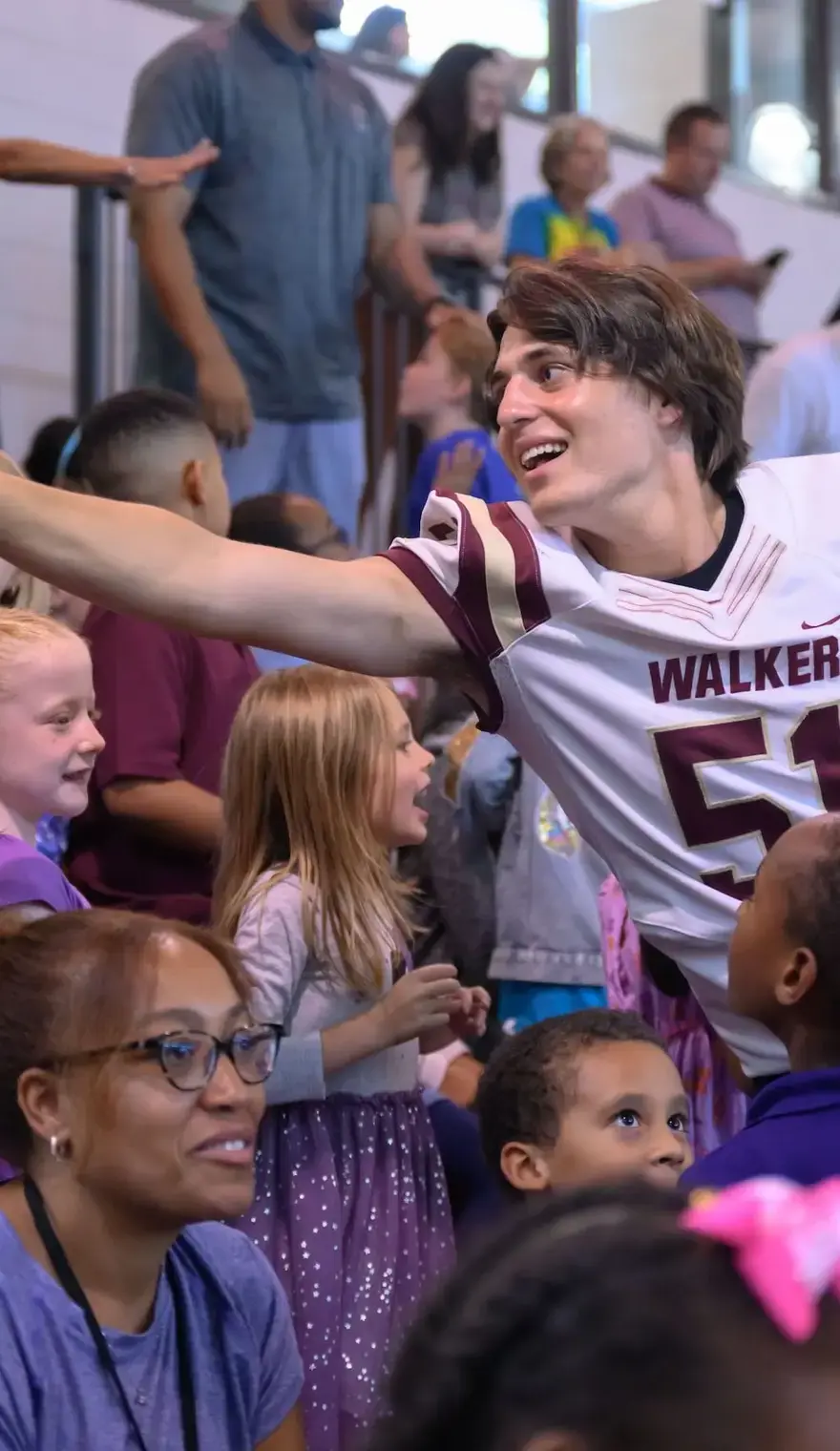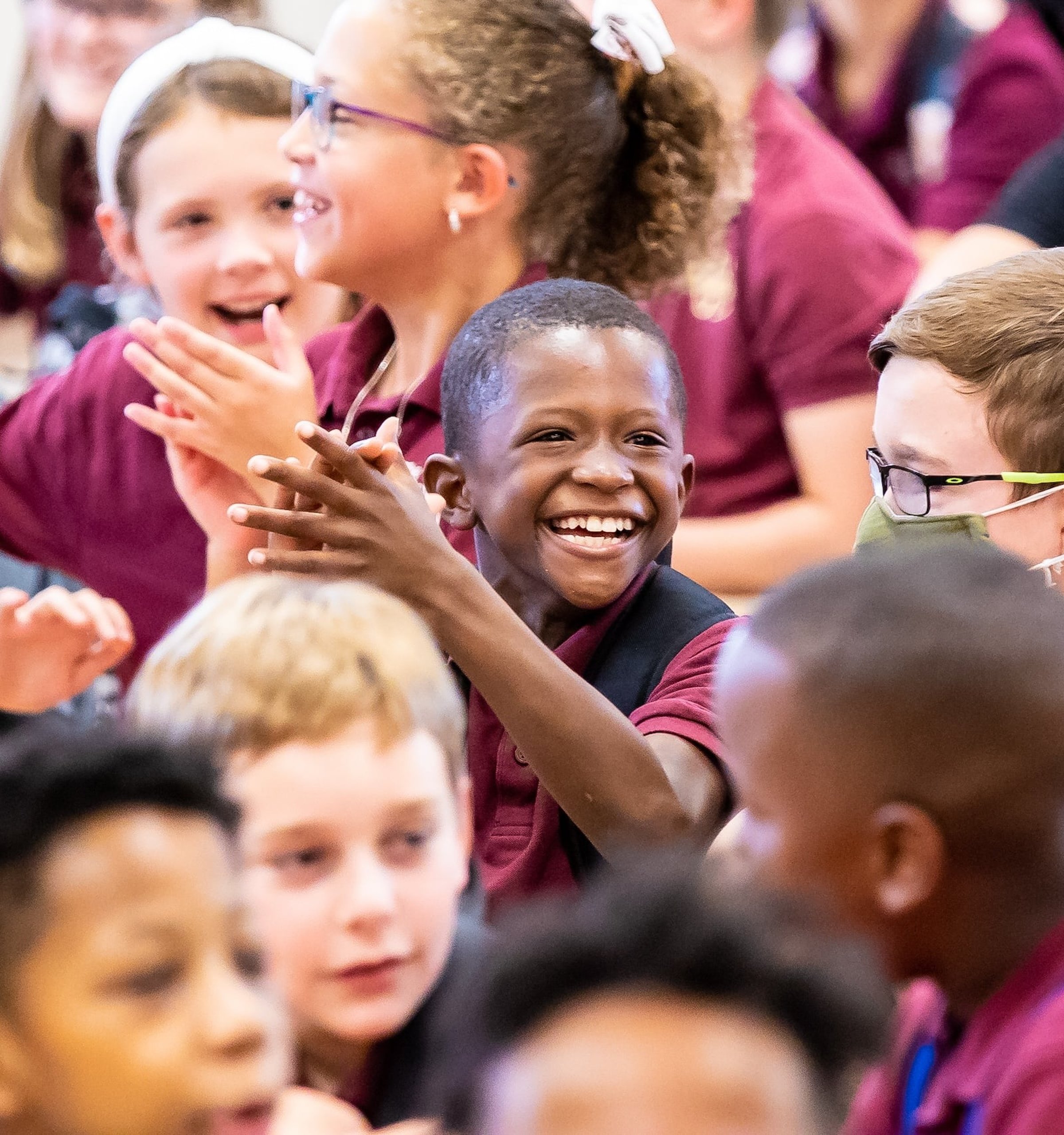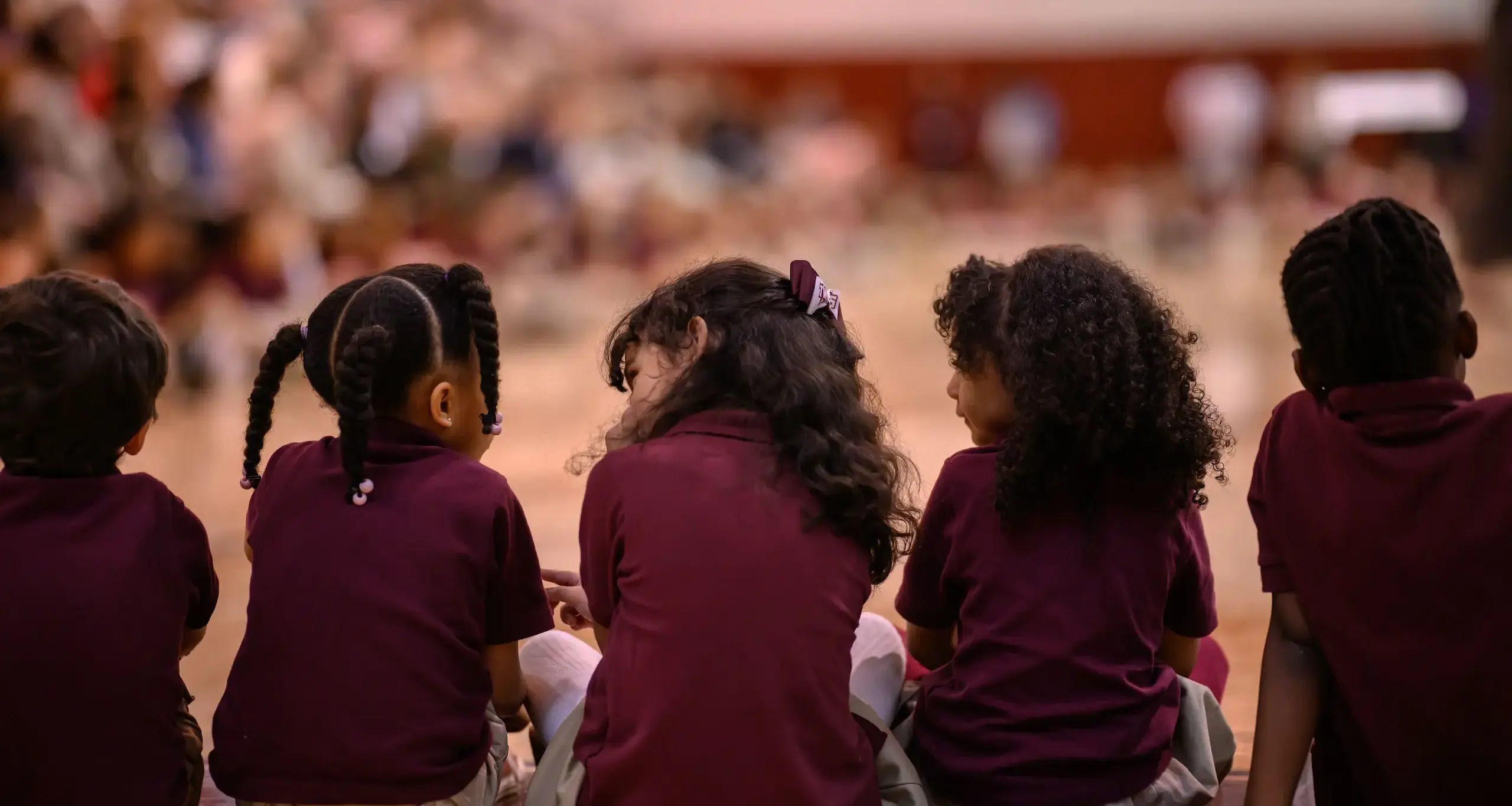As early as the Primary School, Walker students are encouraged to find their voices both on and off the stage. Our talented performing arts faculty members instill confidence in students of all ages, frequently encouraging them to try new instruments, show off their acting chops in a school production, or work behind the scenes on the technical crew to ensure the show goes on without a hitch. This early exposure to being in the spotlight develops students' confidence in speaking and performing in front of large crowds from a young age, while diversified musical and theatrical experiences serve to improve artistic fluency across multiple media.
DRAMA/THEATRE ARTS
| Upper School Theatre |
|---|
|
The Upper School Theatre Program offers many different classes including: Drama I: Beginning Acting, Drama II: Advanced Acting, Directing Seminar, and Stagecraft. The courses are designed to train both the serious and beginning student, while encouraging continued participation and appreciation in the theatrical arts beyond high school. In acting classes, students engage in scene study, script analysis, voice, movement, monologue study, stage combat, and theatre history. We offer two production classes: Musical Theatre and Company Players. Students in the Directing Seminar produce the 10-Minute Play Festival, which presents student-directed work. At least one production class is offered every school year. Opportunities to participate in theatre also exist outside the classroom. There are two or three major productions a year, and auditions are open to all students in the 9th through 12th grade. There is an annual musical with an average of 80 students participating, both on and off stage in various ways. Finally, we are members of the International Thespian Society, an international honor society that recognizes excellence and commitment to the theatrical arts. Thespian members travel to a convention in New York City and to other conventions in and out of the state of Georgia. |
| Middle School Theatre |
|
In the Middle School, the theatre program is designed to expose students to all aspects of theatre. The curriculum offers a variety of experiences that help our students develop strong public speaking skills and an appreciation of theatre. Assignments and activities are planned as opportunities to develop their voice and create interesting characters. Students are encouraged to explore their imagination to create stories that they can convey using their bodies and voices. They are also encouraged to talk about their performances and to learn how to provide a positive critique of someone else's work. The class culminates with a performance in front of an audience. Outside of the classroom, Middle School students are encouraged to participate in the Improvisation Club and the Middle School Musical. |
| DANCE |
| The Dance program offers training for the beginning and advanced dancer and exposes students to the way the body can express story, idea and emotion, whether through technical dance, improvisation or movement. In dance, students are given technical training in ballet, jazz, and contemporary in our Dance class, while in Advanced Dance: Choreography students learn and explore choreographic styles and techniques, including improvisation, structured composition, and group work. These new choreographers finish the semester with a dance concert showcasing their original work. Dancers in all levels may perform in an end-of-the-year dance concert, at fine arts events, or as part of the annual musical. |
_861.webp?version=638594459240170000&version=638594453005300000)
MUSIC
| Upper School ORCHESTRA |
|---|
|
Orchestra programs are the gateway to a world of musical discovery, offering a vibrant platform to explore the beauty of orchestral music. Our program caters to budding musicians, providing a nurturing environment that fosters both skill development and personal growth. Every instrument plays a crucial role in creating beautiful music. It's a collective effort where teamwork and collaboration take center stage. Learning to listen, blend, and synchronize with others are invaluable skills built using string techniques to master complex compositions, providing an environment for continuous growth. Being part of the orchestra nurtures discipline, dedication, and time management. The commitment to regular rehearsals and practice sessions cultivates a strong work ethic and teaches the importance of perseverance, qualities that transcend the realm of music into everyday life. As a member of the orchestra, students are part of a tight-knit community passionate about music, building lasting friendships and creating unforgettable memories through shared experiences, rehearsals, performances, and trips. Memorable trips and activities have included top-rated (“Superior” and “Excellent”) performances, Universal Studios, Disney World, Six Flags, and educational visits to New Orleans and Washington D.C., as well as invitations and student performances at Sydney Opera House and Carnegie Hall. Participation in the orchestra opens doors to various opportunities, from local performances to regional competitions and even scholarships for higher education. The skills and experiences gained through orchestra involvement are highly valued in college and future endeavors. |
| Middle School ORCHESTRA |
|
Middle School orchestra offers a variety of instruments for students to choose from, including violin, viola, cello, and bass. This diversity allows students to find an instrument that resonates with them and explore their musical interests. Orchestra provides an enriching and holistic musical experience for students, igniting their passion for music while nurturing personal and artistic growth. Participating in orchestra not only cultivates musicians but also instills valuable life skills that extend far beyond the realms of music. Students in the orchestra programs receive a comprehensive music education that includes, and reaches beyond, just playing an instrument. Music theory, sight-reading, ensemble skills, and the history of music, build a strong foundation that supports their musical journey. Participation in the orchestra helps students develop critical skills such as discipline, time management, teamwork, and concentration. Regular rehearsals and performances instill a sense of responsibility and commitment, fostering a strong work ethic that extends beyond the music room. Being part of the orchestra creates a sense of belonging and camaraderie among students. They form lasting friendships, collaborate with peers, and learn the importance of supporting each other. |
| UPPER SCHOOL BAND |
|
Band is more than just a school activity or a class about reading and playing music – it’s a transformative musical experience where you learn a different written and interpreted language along with new skills that will last a lifetime. Not only does playing an instrument in the band exercise the mind and body, but it also encourages friendships, cultivates creativity and provides students with a unique opportunity to grow as individuals. As we explore many diverse musical concepts and study composers of past and present, students learn valuable life skills such as time management, multi-tasking, cognitive flexibility, community cooperation, self-discipline, confidence, and leadership skills. We offer Concert Band as a class and additional extra-curricular opportunities, such as Jazz Band, Pep Band & Drumline, Percussion Ensemble, and Pit Orchestra. Upper School bands and ensembles have won numerous awards of excellence, including consistent ‘Excellent’ and ‘Superior’ ratings, many ‘Best in Class’ awards, and several ‘Overall Sweepstakes’ earnings. Invitational performances at prestigious venues like Carnegie Hall and Pearl Harbor add a unique dimension to the students’ accomplishments, showcasing not only their musical skill but also the ability to foster school spirit and teamwork among their peers. |
| MIDDLE SCHOOL BAND |
|
The Middle School band program is an opportunity for students to learn to play a traditional band instrument while developing concentration, teamwork, grit, and time management skills. Students develop a talent that can bring a lifetime of enjoyment. Band classes are curricular fine arts offerings that meet during the school day. In our beginning band, students pick their choice of instrument and first learn to create music as a group. Students learn to read music, play an instrument, and perform as part of an ensemble. We focus on instrumental training as well as the basics of musical literacy including note reading, rhythm, and musical terms. In the Intermediate and Advanced sections, students further develop their individual skill on their instrument and look deeper into the structure and context of music. As students progress by year, we encourage them to develop more individuality in their roles in the band, and they find increasing opportunities to practice teamwork, leadership, and problem-solving. In all classes we spend time listening, both to musical masters and our peers, and developing critical analysis and writing skills. Through performance in the band, we practice responsibility, collaboration, problem-solving, cultural awareness, qualitative judgment, and aesthetic appreciation. The bands are an active presence in the school community and perform at sports contests, assemblies, special events, and evening concerts for the wider community. |
| LOWER SCHOOL MUSIC |
|
In the Lower School, musical instruction is an integral part of a child’s education as it develops collaborative teamwork, self-discipline, and an aesthetic sense of culture. Teamwork is essential as students collaborate by unifying multiple skills such as eye/hand coordination, breath control, and body movement as a whole unit within a class. Self-discipline is enhanced as students hone their skills to be showcased in front of an audience, and the study of music history provides insight into the lifestyle and values of many cultures throughout history. At Walker, the integration of musical instruction into a child’s academic and co-curricular program makes for a well-rounded individual. In the Lower School music classroom, students are exposed to multiple methods of instruction to learn musical concepts. The elements of music are rhythm, melody, harmony, dynamics, form, tempo, meter, and timbre, all of which spiral through the curriculum. Strategies include instrument learning and singing as well as learning music through movement. Technology is also deeply integrated into the curriculum, as today’s music students need the technological skills to thrive in an ever-changing society. |


_857.webp?version=638594459238230000)

